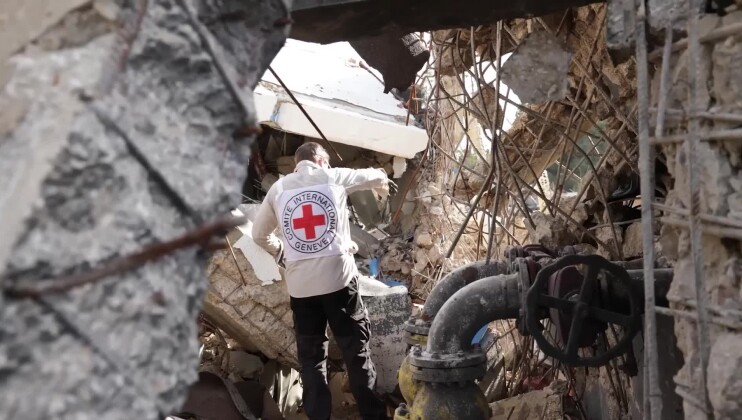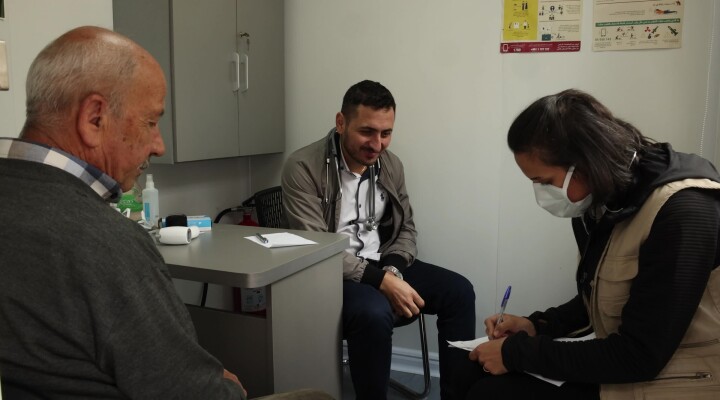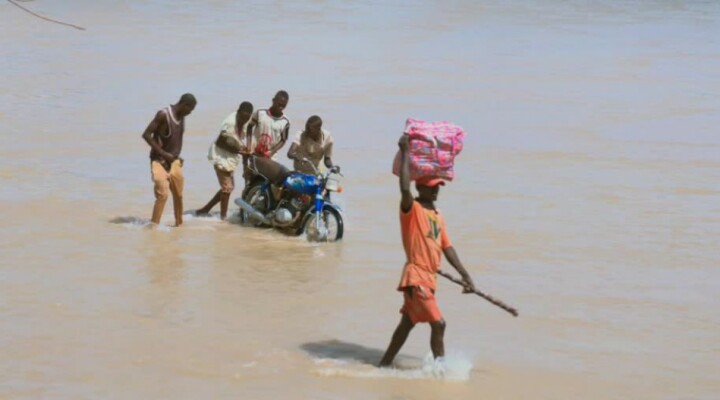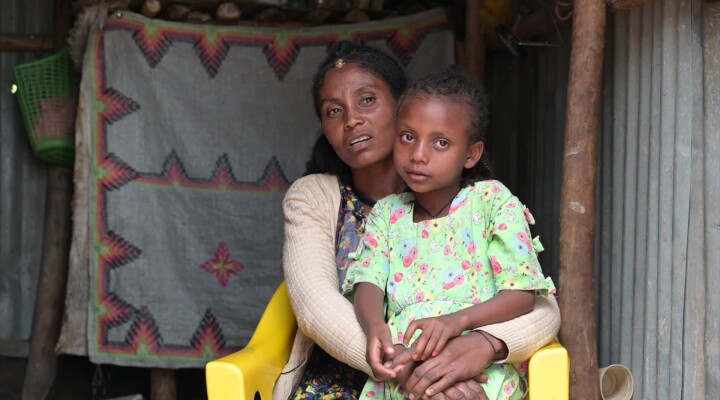Democratic Republic of the Congo: 50,000 Congolese Citizens Expelled from Angola Trapped at Kamako Border Post (Kasai)
50,000 people are currently trapped near the border town of Kamako (Kasaï province, Democratic Republic of the Congo) with no resources, after being expelled from Angola.
Many have had to abandon everything they own and have no means of continuing the journey to their home regions. Some have a few possessions with them, carrying their mattresses on their heads or their furniture on the baggage rack of a bicycle. But most have had to sell whatever possessions they had managed to save in order to pay for food or transport.
The evaluation team of the International Committee of the Red Cross (ICRC), currently at Kamako, reports that these people have been rendered extremely vulnerable and are suffering severe deprivation and hardship. Men, women and children are all crammed together at the border post, in Kamako and in the surrounding area, but the existing facilities are unable to meet even their most urgent needs. They lack accommodation, medical care and food, and there is a significant risk of epidemics.
Arnaud Kalenda has just arrived in Kamako. He describes the situation: “We’re really suffering here in Kamako. People are sleeping outside or in churches. Children are out in the rain.”
The ICRC and the Red Cross Society of the Democratic Republic of the Congo are enabling people passing through Kamako to make free phone calls to their families. Each day, around 100 people make use of this service. The Kamako health centre has also received food for its patients and their families.
Since the beginning of October, over 300,000 Congolese citizens have been expelled from Angola. Most of them were working in the mines. Around 70 percent of the people expelled have passed through Kamako on their way back to their homes in Kasaï province.
Anna Praz, head of ICRC operations in Kamako (French, 17″) –
“These people left with very little, and they didn’t have much time to get ready. They’re turning up here empty-handed, or with very few possessions. And some of them were frightened when they left.”
Anna Praz, head of ICRC operations in Kamako (French, 20″) –
“And now there in a place which is more-or-less foreign to them, because they’ve been away from the Congo for a long time, and some of them have had no contact with their families for several years.”
The ICRC is concerned about these people returning to a province that experienced serious disturbances in 2016 and 2017. Ethnic and other violence resulted in thousands of deaths and forced over a million people to flee, according to the United Nations Office for the Coordination of Humanitarian Affairs (OCHA). In September 2017, UNHCR reported that nine out of ten villages had been reduced to ashes in the Kamako area alone.
Anna Praz, head of ICRC operations in Kamako (French, 15″) –
“Others fled empty-handed during the 2016–2017 crisis, and now they’re once again having to leave, and return to the places where they suffered.”
Pedram Yazdi, Kinshasa (Democratic Republic of the Congo): + 243 817 008 536
Krista Armstrong, Geneva (Switzerland): + 41 79 79 217 32 87
Follow the ICRC on facebook.com/icrc and twitter.com/icrc
SHOTLIST
Locations: Kamako and surrounding area (Democratic Republic of the Congo)
Running time: 4:47
Format: HD H264 mp4
Languages: French, Lingala
ICRC ref: AV924N
Date: October 2018
Camera operator: Jonathan Busasi
Copyright: ICRC, access all
00:00 – 05:02: Congolese citizens leave Angola for the DRC with their luggage on their heads, passing in front of the offices of the Congolese Directorate-General of Migration.
05:03 – 09:25: Congolese citizens in the no-mans land between Angola and the DRC.
09:26 – 13:28: Kamako customs post.
13:29 – 34:06: Congolese citizens leave Angola for the DRC with their luggage on their heads (4 shots).
34:07 – 38:01: A family leaves Angola for the DRC, carrying their luggage.
INTERVIEW, ANNIE LOKWA, Congolese citizen (Lingala, 6″)
38:02 – 43:41: “I left Angola with my three children, bringing just my clothes, nothing else”
INTERVIEW, ARNAUD KALENDA, Congolese citizen (Lingala, 6″)
43:42 – 49:14: “We’re really suffering here in Kamako. People are sleeping outside or in churches. Children are out in the rain.”
49:15 – 52:17: A child walks/plays near the border.
52:18 – 55:14: Congolese citizens get ready to leave, with their luggage.
55:15 – 58:31: A woman who has returned to the DRC from Angola sits with her baby.
58:32 – 01:08:17: Congolese citizens look through barbed wire into Angola.
01:08:18 – 01:11:35: Congolese citizens wait in the no-mans land between Angola and the DRC.
01:11:36 – 01:15:06: Congolese citizens with their luggage in front of the Directorate-General of Migration.
01:15:07 – 01:17:37: A Congolese woman organizes her luggage.
01:17:38 – 01:22:09: A family picks up their luggage and moves off.
INTERVIEW, GASTON MADINGA, Congolese citizen, surrounded by his family. (Lingala, 16″ 01:22:10 – 01:38:15): “I left Angola with my wife, my daughter and my three grandsons. Two of my children have stayed behind in Nzaji, in Angola. I haven’t had any news from them.”
01:38:16 – 01:42:16: Gaston MADINGA in conversation with an ICRC employee. His wife, his children and his neighbours are nearby.
01:42:17 – 01:45:37: Gaston MADINGA’s wife.
01:45:38 – 01:49:15: Gaston MADINGA’s daughter, with two of her children.
01:49:16 – 01:53:25: Gaston MADINGA shows the place where he and his family are currently living, in the storage area of Kamako market.
01:53:26 – 01:57:20: Congolese citizens camp at the border as they wait to resume their journey.
01:57:21 – 02:00:06: The cooking pot of a Congolese woman trapped at the border.
INTERVIEW, FRANCOIS MUTOMBO, Congolese citizen (Lingala, 12″)
02:00:07 – 02:11:33: I’m going a long way, to Kananga, because I’ve heard that some of my family are there. I don’t have any money. My children are ill, and I don’t have any medicine for them.
02:11:34 – 02:15:24: Francis MUTOMBO and his wife carry their luggage.
02:15:25 – 02:20:49: Francis MUTOMBO’s wife carries some of the family’s luggage.
02:21:00 – 02:26:38: Francis MUTOMBO joins his wife and child, who are carrying luggage on their heads.
02:26:39 – 02:30:08: Francis MUTOMBO’s two children, who are ill, sleep on a mat on the ground.
02:30:09 – 02:33:20: Francis MUTOMBO and his wife sit with their luggage.
INTERVIEW, Jina BUKASA, Congolese citizen (Lingala, 8″)
02:33:21 02:42:14: “When I arrived at the border I didn’t have any money, so I had to sell my sleeping mat for 10,000 francs.” (€ 5.40)
INTERVIEW, Jina BUKASA, Congolese citizen (Lingala, 21″)
02:42:15 – 03:03:21: “I used the money to rent a bike and I put my children and our possessions on that. We don’t have any relatives here, so we’re sleeping in the church.”
03:03:22 – 03:06:45: Jina moves around the church, which is currently her home.
03:06:46 – 03:30:01: Church. 6 shots.
INTERVIEW, TSHEBWE KAZUMBA, Congolese citizen (French, 24″)
03:30:02 – 03:54:12: “The Red Cross helped me. They let me speak to my children in Tshikapa for a few minutes. But I can’t get to Tshikapa. I’ll work for a few days, to earn the money I need to travel to where my children are, God willing.”
03:54:13 – 04:14:08: Tshebwe phoning one of his nine children who have stayed behind in the DRC. 8 shots. Three months ago, after his wife died, Tshebwe left for Angola in search of work.
INTERVIEW Anna Praz, head of ICRC operations in Kamako (French, 14″) – 04:14:09 - 04:14:09 – 04:28:48:“These people left with very little, and they didn’t have much time to get ready. They’re turning up here empty-handed, or with very few possessions. And some of them were frightened when they left.”
INTERVIEW Anna Praz, head of ICRC operations in Kamako (French, 20″) –
04:30:00 – 04:50:49 “And now there in a place which is more-or-less foreign to them, because they’ve been away from the Congo for a long time, and some of them have had no contact with their families for several years.”
INTERVIEW Anna Praz, head of ICRC operations in Kamako (French, 15″) – 04:51:36 – 05:06:10 “Others fled empty-handed during the 2016–2017 crisis, and now they’re once again having to leave, and return to the places where they suffered.”
05:06:11 – 05:20:03: Congolese citizens wash in the River Mwadji, while others move away in various directions. 2 shots.
05:20:04 – 05: 32:36 : Congolese citizens leave Kamako. 2 shots.
END



